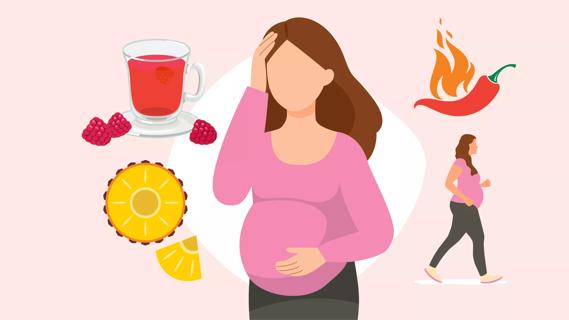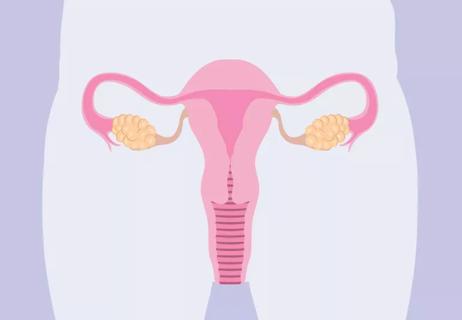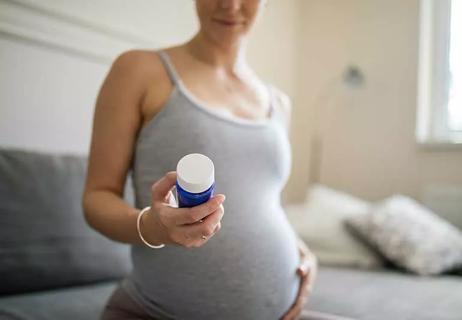Staying up-to-date on vaccines encourages a healthy pregnancy, but not all vaccines are recommended when you’re pregnant

When you’re pregnant, you know that you’re in for a host of prenatal visits to make sure you’re healthy and the fetus is developing appropriately.
Cleveland Clinic is a non-profit academic medical center. Advertising on our site helps support our mission. We do not endorse non-Cleveland Clinic products or services. Policy
And during those appointments, you can expect to have urine tests, blood tests, ultrasounds and other tests that will make sure your pregnancy is progressing healthily.
Your prenatal care may also include getting some vaccinations during your pregnancy.
Some vaccines are encouraged during pregnancy. Others should wait until after your baby is born.
"Most vaccines that contain live viruses shouldn’t be administered during pregnancy because they might be harmful to the fetus. But others are very safe during pregnancy. They’re important to your health and help to encourage healthy fetal development,” says Ob/Gyn Oluwatosin Goje, MD.
Confused as to which vaccines you should get and which you should avoid during pregnancy? Dr. Goje walks us through it.
Vaccines strengthen your immune system so your body can fight off serious infectious diseases that can pose a risk to you and the fetus. They also benefit society by preventing the spread of communicable diseases.
If you’re not up-to-date on certain vaccines, you may be more susceptible to diseases that can harm you or the developing fetus.
Not sure if you’ve had the proper vaccines? You’re not alone.
“A lot of people don’t have immediate access to their vaccination records, particularly from their childhood vaccinations,” Dr. Goje states. “If you’ve moved a lot or visited multiple healthcare systems throughout your life, piecing that information together can be tough.”
Fortunately, your healthcare provider, such as a primary care physician, midwife or Ob/Gyn, can run a simple antibody test to check your blood for signs of immunity against diseases that can be harmful during pregnancy. From there, you and your provider can discuss what vaccines would be beneficial to you during pregnancy and which they would encourage you to wait to get after giving birth.
Some vaccines should be avoided during pregnancy because they can be harmful to the fetus. But others are safe during pregnancy — and they’re important for keeping you both safe.
All vaccines are tested for safety under the supervision of the U.S. Food and Drug Administration (FDA). The vaccines are checked for purity, potency and safety. And the FDA and the U.S. Centers for Disease Control and Prevention (CDC) monitor the safety of each vaccine for as long as it’s in use.
The CDC also has guidelines regarding which vaccines should be given during pregnancy. Those are based on research studies about the potential benefits and risks of vaccines to both the pregnant person and the fetus.
If you’re allergic to an ingredient in a vaccine, such as eggs in the influenza vaccine, talk with your healthcare provider before getting vaccinated.
There’s good reason your healthcare provider will recommend certain vaccines during your pregnancy: They’re proven to be safe and to protect you and the fetus from serious complications.
“Getting vaccines during pregnancy can protect you from certain illnesses, and that immunity can transfer to the fetus,” Dr. Goje explains. “That can help keep the baby protected during the first few months of their life until they can get vaccinated themselves.”
But remember, even when you get vaccinated during your pregnancy, it’s important to keep up with baby’s own vaccination schedule, too. That’s because immunity from vaccines will decrease over time. So2, your baby will still need to be vaccinated on schedule to keep them safe from disease.
Here’s a look at some common vaccines and whether they should be given during pregnancy:
| Vaccine | Recommended during pregnancy? |
|---|---|
| COVID-19 | Yes. |
| RSV | Yes. |
| Flu (inactivated) | Yes. |
| Tdap — tetanus, diphtheria and pertussis (whopping cough) | Yes. |
| Hepatitis A | Yes, if you haven’t already been vaccinated. |
| Hepatitis B | Yes, if you haven’t already been vaccinated. |
| HPV — human papillomavirus | No. |
| Flu (live virus) | No. |
| MMR — measles, mumps and rubella | No. |
| Varicella — chickenpox | No. |
| Vaccine | |
| COVID-19 | |
| Recommended during pregnancy? | |
| Yes. | |
| RSV | |
| Recommended during pregnancy? | |
| Yes. | |
| Flu (inactivated) | |
| Recommended during pregnancy? | |
| Yes. | |
| Tdap — tetanus, diphtheria and pertussis (whopping cough) | |
| Recommended during pregnancy? | |
| Yes. | |
| Hepatitis A | |
| Recommended during pregnancy? | |
| Yes, if you haven’t already been vaccinated. | |
| Hepatitis B | |
| Recommended during pregnancy? | |
| Yes, if you haven’t already been vaccinated. | |
| HPV — human papillomavirus | |
| Recommended during pregnancy? | |
| No. | |
| Flu (live virus) | |
| Recommended during pregnancy? | |
| No. | |
| MMR — measles, mumps and rubella | |
| Recommended during pregnancy? | |
| No. | |
| Varicella — chickenpox | |
| Recommended during pregnancy? | |
| No. |
The COVID-19 vaccine is recommended for everyone over the age of 6 months. The CDC says that during pregnancy, you may be at a higher risk for becoming severely ill if you’re infected with COVID-19. That means a higher likelihood that if you catch COVID-19, you could need to be hospitalized and have complications that can severely affect fetal development.
The COVID-19 vaccine provides the best protection against developing severe cases of COVID-19 infection.
“What we’ve found in a growing number of research studies is that the benefits of COVID-19 vaccination during pregnancy far outweigh any potential risks,” Dr. Goje reassures.
Recommendations regarding how often you need a COVID-19 vaccine to be fully protected depend on several factors. Like when your last COVID-19 vaccine was given, which vaccine you got and if you’re living with a condition that compromises your immune system. Talk with your pregnancy provider or a primary care provider about whether you’re due for a COVID-19 vaccination.
The flu shot is safe and effective for every trimester of pregnancy. And an annual flu vaccine is the best way to protect yourself from the flu. Avoiding the flu is especially important when you’re pregnant. Because research suggests that getting the flu during pregnancy can be associated with serious complications.
“Pregnancy can make you more susceptible to becoming more seriously ill if you get the flu,” Dr. Goje notes. “And flu infection in a pregnant person is associated with increased risks, like preterm birth, low birth weight and even pregnancy loss.”
The flu vaccine comes in a few different forms, including a live virus that’s given as a nasal spray and an inactivated injection (flu shot). If you’re pregnant during flu season, you should plan to get the inactive flu shot. The live vaccine should be avoided during pregnancy.
The RSV vaccine is a relative newcomer. And it’s a game-changer.
RSV (respiratory syncytial virus) is a respiratory illness that usually doesn’t have severe effects on healthy adults. But it can be dangerous — even life-threatening — for older adults and babies under 6 months old.
Babies can be immunized for RSV as they enter their first respiratory illness season (typically, around September in the Northern Hemisphere).
But if you get the RSV vaccine during pregnancy, your baby will be protected from RSV from the get-go. And they won’t need to get immunized later.
The RSV vaccine is administered during the third trimester (between 32 and 36 weeks of pregnancy) during the RSV season.
Pregnant people should plan to get the Tdap vaccine starting in the 27th week of pregnancy.
Tdap protects you and your baby from tetanus, diphtheria and pertussis (whooping cough).
“The best advice is to get a Tdap vaccine during every pregnancy, regardless of whether you’ve had one in the past,” Dr. Goje advises. “Protection from these infections wanes over time. Getting the vaccine will make sure you pass along antibodies to help protect the baby from the day they’re born.”
And early protection matters. Babies can’t get their first dose of the Tdap vaccine until their two-month visit. That leaves a critical window of time where they can be infected with whooping cough during their first weeks of life. Whooping cough is highly contagious and can be life-threatening to infants.
For that reason, Tdap vaccines are recommended not just for pregnant people, but also for any adults who’ll care for the baby. Talk with your provider if you have older children in the home who may also be candidates for Tdap boosters to help protect your new baby.
Vaccines typically are created in one of two ways.
Some use tiny amounts of live viruses that introduce germs to your immune system. Because they’re introduced at a very low dose, they typically won’t make you sick. But they train your immune system to defend you against that virus. That means that the next time you’re exposed to the virus, your body has the tools it needs to fight it off.
Other vaccines use deactivated viruses. That’s to say, viruses that aren’t alive and can’t replicate in your body. But they’re still recognized by your immune system as invaders. Your body fights off deactivated viruses like they’re the real thing, so if you’re infected later, your immune system is ready to mount a defense.
Deactivated vaccines — like vaccines for COVID-19, RSV, whooping cough and flu shots — have been proven to be safe and effective for pregnancy.
Live vaccines aren’t recommended for pregnancy. That’s because scientists believe there’s a chance that live viruses in those vaccines could (at least in theory) cross the placenta and infect the fetus.
Live vaccines that aren’t recommended during pregnancy include MMR (which protects you from measles, mumps and rubella) and the varicella (chickenpox) vaccine. Babies typically get their first chickenpox and MMR vaccines around their first birthday.
The HPV vaccine is also not recommended during pregnancy. But unlike the MMR and chickenpox vaccines, HPV isn’t a live vaccine. It’s not given during pregnancy, though, because it hasn’t yet been thoroughly tested to be proven safe during pregnancy.
If you’re concerned about your vaccination status and its effect on fetal development, talk with your healthcare provider. They can help you understand the benefits of vaccines during pregnancy and advise you on which vaccines are best for you during pregnancy.
Learn more about our editorial process.

Science says only one way actually works, but there are a few others that are still safe to try

When a growing fetus puts pressure on your abdomen, your belly button may pop out or even flatten

Talk with them about their new sibling early and often

Dental care is not only safe during pregnancy, but it’s also highly recommended

A healthy pregnancy diet includes good amounts of folic acid, DHA, calcium and more

If left untreated, you risk complications, early labor and passing the infection to your baby

Lifestyle changes, like a healthy diet and exercise, can help with fertility issues

Always talk with your doctor for advice, too

Your metabolism may torch 1,300 to 2,000 calories daily with no activity

A gentle touch in all the right places may help drain your sinuses